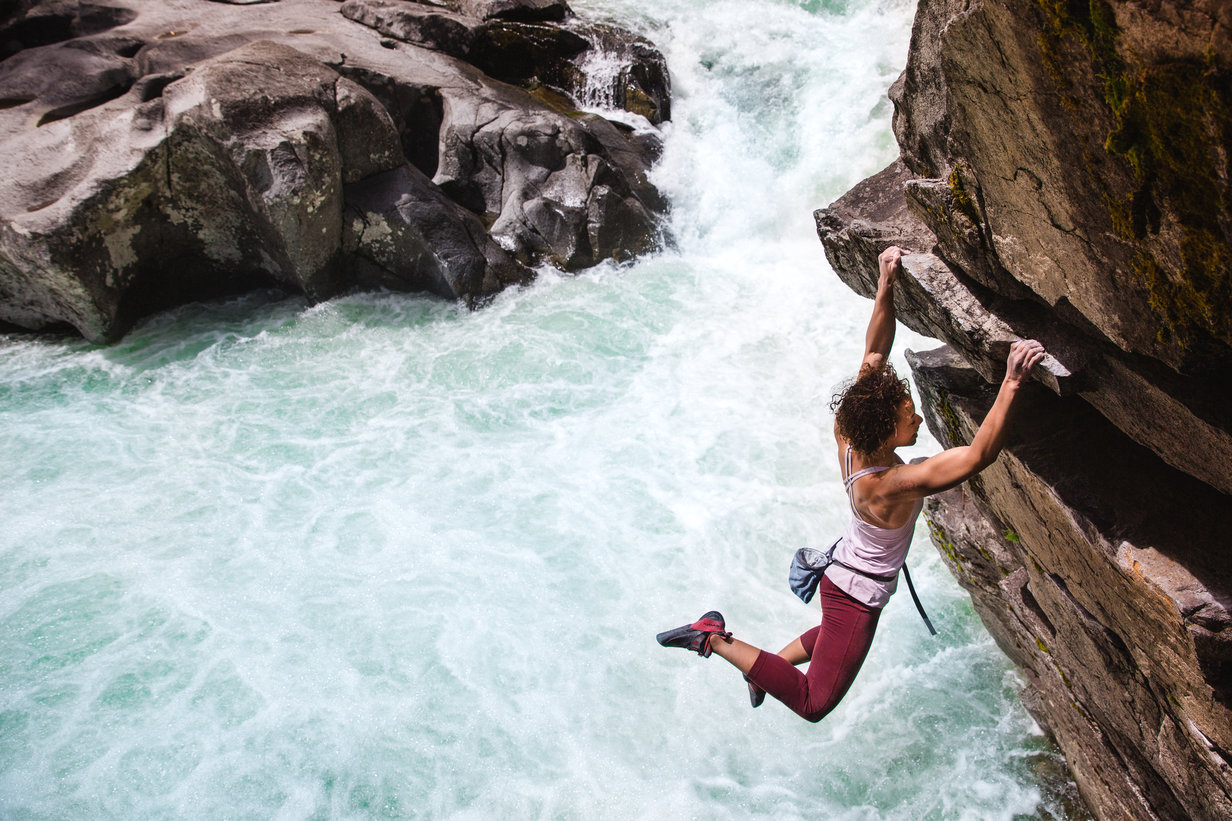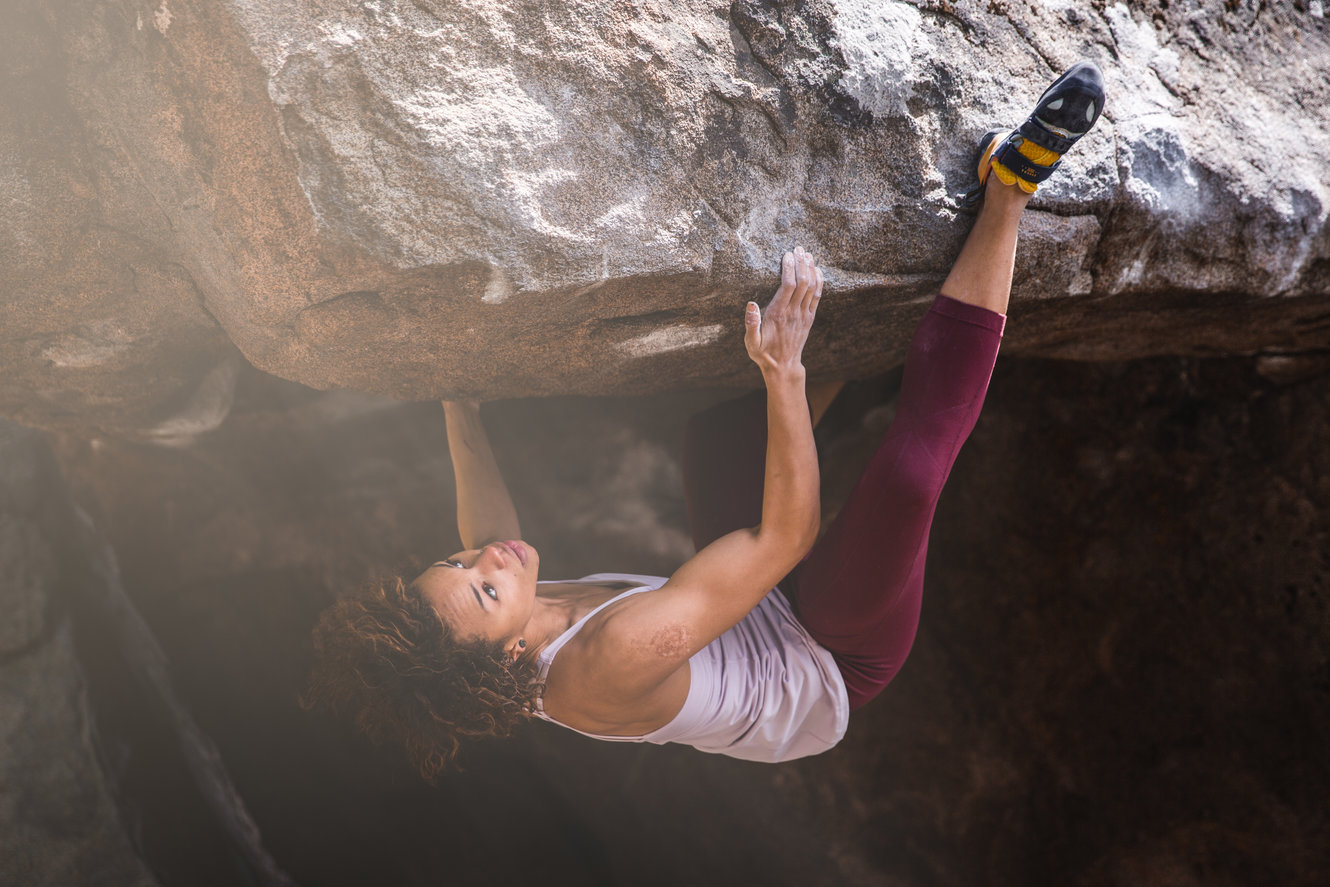Beacons of Badassery is an interview series shining light on strong women.
After spending most of my life trying to prove that I’m strong enough to be one of the guys, I’ve realized that instead of trying so hard to fit a certain expectation, we should be redefining what it actually means to be strong.
These women are doing just that.
Beacon of Badassery: Melise Edwards
When Outdoor Research featured phenomenal photos of Melise Edwards bouldering in Leavenworth, I wanted to head there immediately. I also wanted to find out more about the woman who was totally crushing the climbs. After discovering her blog, where she discusses sexism, lack of diversity, and the mental game in climbing, I asked her to delve more into these issues here.

You wrote a blog post calling out mansplaining in climbing, which resonated with so many women in the climbing community, because sexism is very much a thing in climbing (and society as a whole). Obviously, writing something public like that is one way to address and deal with the sexism, but how do you handle it in the moment at the gym or the crag? And what do you think are some steps we can take to change the culture?
This is such a great question. Obviously handling these topics online and in person are vastly different. If I experience something that feels like a microaggression in person, I try really hard to continue doing what I am doing, whether it be focusing on my own climbing training or on a project at work, and let my strength and ideas speak for themselves.
Sometimes people will make excuses for your strength (“if I weighed 120lbs or had small fingers that climb would be easy for me too!”) or invalidate your experiences because they don’t reflect their own lived experiences (“I’ve never seen sexism occur, so it must not exist!”) or even become upset that “a girl” can do things they cannot, whether that be in a professional setting or the climbing gym. This can be tricky, because it can be hard not to internalize these constant comments that suggest you are doing something wrong by being more confident, stronger, or more competent than expected. I think it’s important to be direct and empathetic when these conversations arise. I remind myself that people are seldom intentionally trying to hurt you or be dismissive to your feelings; it’s a societal and cultural byproduct that seeps into our subconscious and can make men and even other women feel angry, scared, annoyed, or dismissive because you’ve challenged something they believe on some level to be true. It’s hard not to be angry. It’s hard not to want to yell and shake people for not understanding. I try really hard to stay calm, make people feel at ease around me and hopefully invite dialogue to happen so these mentalities can change.
I think it’s important to create a good support system too, so find women-specific groups to climb with or events that champion women. It’s important to note that it is not your job to constantly engage in these conversations or answer to sexist comments. But to change these mentalities, I think it will be essential to be able to have calm, empathetic dialogue that makes both people feel respected and heard.

You’ve also addressed the lack of diversity in climbing: “At one point, the thought did come to me that seemingly every professional climber was white with blond hair and skinny as a toothpick.” Have you noticed a change in this since you first started climbing? Groups like Brothers of Climbing and @BrownGirlsClimb have started to bring awareness to the issue and encourage diversity – what more do you think can be done?
I think groups like BOC and BGC among countless others have done a fantastic job of encouraging diversity and creating visibility for groups that never see themselves reflected in predominantly white sports. The change I’ve seen has been small, but powerful and gaining momentum. Already we see a shift in how companies are choosing to be more inclusive with their marketing and stories, or more events that champion people of color (e.g., Color the Crag 2017).
The climbing gyms I frequent are still strikingly white, the outdoor spaces I travel to also represent this. As a woman of color, I am often asked what more can be done and why things are currently the way they are. As one person of color in the climbing community, I do not have all of the answers and my viewpoints do not reflect the ideas and beliefs of every single woman or POC in the climbing community.
I think a lot of uncomfortable factors play into why diversity is lacking in the climbing community currently, but I have so much respect for groups like Vertical Generation, BOC and BGC who are trying to change this by encouraging diversity and visibility. Similarly to how championing women in climbing does not suggest we are trying to tear down men, championing diversity is not synonymous with being against any other group; it is a call to encourage and support people who feel underrepresented.
In a couple other posts, you’ve mentioned that climbing challenges you mentally and emotionally, as well as physically. This is so, so true, and I personally find myself struggling a lot with negative self-talk and a lack of self confidence. What are your strategies for dealing with this and the whole mental component of climbing?
This is such a hard one! I have a chronic difficulty with negative self-talk while climbing. To be super honest, this is something I’ve had to dig really deep to find the source of this anxiety, negativity and low confidence when it comes to climbs. A lot of these things had their root in life experiences that had nothing to do with climbing, yet showed themselves whenever I had a sincere challenge at hand. I realized I carried a lot of anxiety with me everywhere, not just in my climbing, and I had – not a desire – but a desperate need to succeed. If I failed on a climb, I would immediately be heart broken and feel really negatively about myself. This hasn’t been remedied overnight, in weeks or even months. It has been an absolute process of understanding myself and my lived experiences and how that relates to where I am today.
I try to challenge the negative self-talk and mentally spin a different picture: I tell myself I’m competent, that I have every tool I need to succeed and that it’s okay to fail. I try to focus on movement and pull the focus away from everything that could go wrong. And if possible, I try really hard to laugh and use humor to take the seriousness out of whatever I’m doing. I am an extremely serious, focused person sometimes, and it can both hurt and help me in my climbing.
What is your definition of strong? How has it changed through climbing?
Strength and my idea of what it means to be a strong person or climber have constantly evolved. Strength is more than just the physical association; mental strength, determination, positivity, etc. have been just as, if not more, valuable than pure physical strength in my climbing and personal life.
And now for something a little more about the fun of climbing – what is your favorite crag? Do you have a place that you dream of climbing someday?
Oh, always! 🙂 My favorite crag might be Squamish, BC. It’s a regally gorgeous place with such a fun, playful style of climbing on incredible rock. The southeast is where I grew up, so areas like Boone, Horse Pens 40, or Rocktown also have a special place in my heart. It would be a dream to one day climb in Rocklands, South Africa!
Thank you, Melise, for tackling these complicated topics with thoughtfulness and insight.
Check out more awesomeness from Melise here!